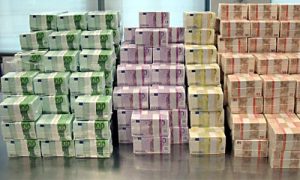It is a well known fact that the underworld on the Italian peninsula controls vast stretches of the Italian economy.
Some readers would remember the underworld’s waste-management activity that ended in the sinking of some 42 ships laden with toxic and/or hazardous waste throughout the Mediterranean. This was well known to environmentalists but confirmed during the Palermo maxi-processo, when Mafia turncoat Francesco Fonti gave evidence identifying the location of one such sunken ship, the Kunsky, loaded with 120 barrels of toxic waste, just off the Calabrian coast.
This network of organised environmental crime is so vast that, at one time, it also dumped toxic, hazardous and nuclear waste in Somalia. The warlords in the Somalia civil war were partly financed by the Italian underworld, which supplied them with arms in return for their consent to the dumping of the toxic, hazardous and nuclear waste in Somalia. Rai Tre’s investigative journalist Ilaria Alpi and her cameraman Miran Hrovatin were murdered in Mogadishu after having successfully tracked down the toxic shipments.
In early 2008 it was identified that buffalo mozzarella originating from some 83 dairy farms in an area near Naples was tainted with dioxin. The buffalo were grazing in an area where the Mafia was controlling the dumping of toxic waste containing dioxin. When ingested through food dioxin can cause birth defects and organ failure in mammals. Large quantities of buffalo mozzarella tainted with dioxin were withdrawn from the market.
Carmine Schiavone, another Mafia turncoat, spilled the beans on more dumping of toxic and hazardous waste by the Mafia in the Naples area, in particular in the area around Casale di Principe. It has been reported that the incidence of cancer in these areas has skyrocketed as a result of the dumping contaminating the water table.
It is estimated that the underworld has garnered some €20 billion a year in the last few years from its illicit dealings in waste. Add to this the billions from its drug dealings, estimated at another €20 billion annually and you can clearly understand the Mafia’s need to launder huge sums of money.
Two specific areas seem to have been selected for this purpose. One such area was an investment in wind-farms in Sicily. Wheeling and dealing in the Sicilian wind farms was a certain Gaetano Buglisi who, for a time, made use of Malta’s fiduciary services by hiding behind their corporate veil. Last February the Italian Courts sentenced him to three years in jail as well as a substantial fine on finding him guilty of tax evasion.
It is within this context that one should try to understand the iGaming saga in Malta.
In the last few days the Malta Gaming Authority (MGA) has suspended the operating licences of a number of iGaming operators. Until the time of writing, six operators have been suspended, namely : Uniq Group Limited (Betuniq), Betsolution4U Limited, Alibaba Casino Limited, Soft Casino Limited, Fenplay Limited and Soft Bet Limited . The MGA did not act on its own initiative but at the request of Italian law enforcement agencies.
In a press release, the MGA stated these licences had been suspended “further to investigations and arrests carried out by the Italian law enforcement authorities in collaboration with the Maltese police. The MGA is providing full support to the relevant authorities so that Malta’s reputation as a gaming jurisdiction of excellence is kept free from crime and money laundering. The MGA is also alerting counterpart regulators in other EU jurisdictions about this case.”
In a further press release issued on 25 July it was stated “At the time of application (according to the MGA’s records), in line with standard procedures, all directors, shareholders, senior managers and ultimate beneficiary owners of these companies have been screened through MGA’s systems and protocols, using probity tools and national and international contacts and organisations. This forms part of the probity checks conducted at pre-licensing stage and before the actual business model of the gaming operation in question is screened and other control systems are checked and approved. The licensing process also includes independent audits, such as system and compliance audits which are carried out by approved external auditors.”
It seems that the due diligence carried out in Malta is no match for the underworld. It is possibly a case of amateurs trying to keep professionals in check.
On Thursday, Finance Minister Edward Scicluna stated that a review of due diligence procedures will be undertaken and changes will be put in place if required. As a start, he should consider embedding complete transparency in iGaming. Hiding the identity of iGaming operators should be discontinued by emending legislation and discontinuing fiduciary services. This corporate veil is unfortunately being used as a tool by the underworld. As a nation we could do better if we make an effort to keep organised crime as far away from Malta’s economic activities as possible. It is pertinent to ask: how many iGaming jobs in Malta depend on Mafia linked operators.
published in The Malta Independent on Sunday, 2 August 2015
On this blog on the same subject one can view the following :
2009 The eco-threat of the Italian Mafia.
2013 Ecocide in the Mediterranean. The known consequences so far.
2013 Schiavone’s secrets on eco-mafia operations: when will Malta’s government speak up.





